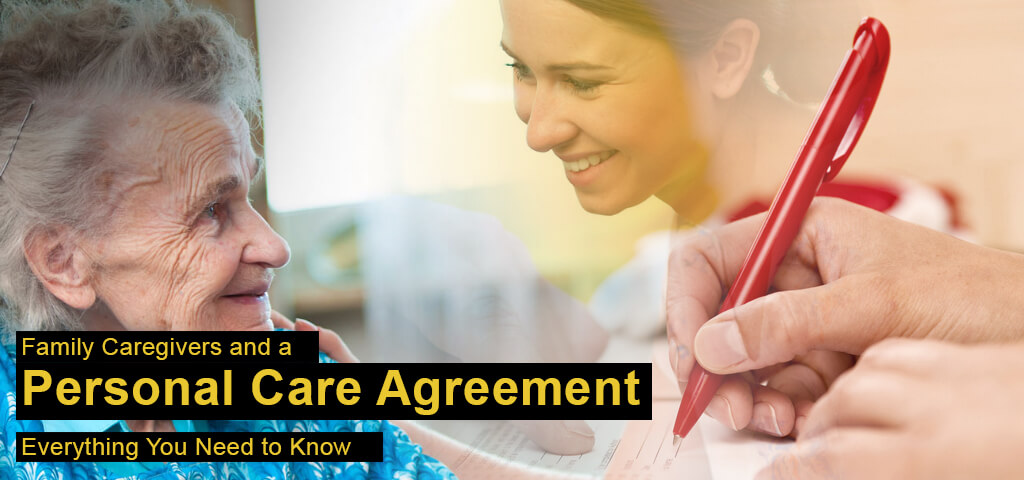Family Caregivers and a Personal Care Agreement – Everything You Need to Know
Taking care of an elderly is a great responsibility and brings many challenges, including difficulties in covering costs. But it is possible to receive help. Here are some tips that can be useful. In addition to emotional and physical stress, caring for a family member often brings monetary concerns. Among the many words that are used to describe family caregivers – invisible, overwhelmed, heroic, to name a few – one is often assumed: “unpaid.” Although this is not true. Family caregivers are often praised as a fundamental part of the elderly care workforce; most do not receive a salary for their caregiving services.
What is a family caregiver agreement
First, one must know many caregivers need financial help. In addition to emotional and physical stress, care often brings monetary concerns. Payment of medical supplies and medications that are not entirely covered by insurance. Transportation, home adaptations, home care or any of the many other expenses can wreak havoc on a budget. No wonder why often many family caregivers ask, “Can I get paid to take care of my mother through a personal care contract?”
The short answer? It depends. A longer answer would explain the differences that determine eligibility for a caregiver contract: in what state you live, the age or status of the person you are caring for, your relationship with that person, your income and assets, and more.
Here are seven options in a caregiver contract worth exploring:
Long-term care insurance policy.
As stated, if any of your family members have long-term care insurance that includes home care- this policy is eligible and will allow a family member to be paid. However, some policies exclude people who live in the same household. If you have doubts, make sure to ask an insurance agent to explain the benefits and conditions of the long-term policy.
Private contract with a family member.
If your family member has savings or other resources and wants to pay you, a private contract or a personal care agreement may work well for both of you. But this option can lead to family conflicts and emotional and legal problems. Be sure to consult an experienced lawyer to write a contract that describes your salary and responsibilities. Your salary must be consistent with current local rates. Any impact on inheritance must be clear as well. Finally, all interested parties (siblings, other relatives) must understand and approve the agreement.
Senior personal care programs aimed at the consumer.
All states allow an eligible older adults to hire, fire and train their home care assistants. These programs in each state have a formal name and eligibility requirements. Family members or friends can be hired. However, only 12 states allow spouses to be paid as well. Make sure you are aware of the details since there is a lot of paperwork involved. Many participants use a financial services agency to manage taxes and other requirements. The laws of each state have different payment schedules and eligibility requirements.
Veterans’ caregivers.
The US Department of Veterans Affairs (VA) has several support programs for caregivers. For senior caregivers of veterans injured in military conflicts, the law provides monthly stipends. The amount is determined by a combination of hours and wages that would be paid to a home care assistant. Other benefits for caregivers include travel expenses, access to health insurance, mental health services and 30 days off per year. Caregivers who require assistance and are home bound may be eligible for the VA Assistance and Assistance Pension Benefit.
Coupons for employed caregivers.
Services include adult daycare, caregiver personal care, case management, home delivery and transportation.
Tax credits.
Almost half of the states (23) have some form of the tax credit for dependent elderly caregivers. There are different eligibility requirements and types of expenses allowed. Tax credits are no refunds. It only allows a person to deduct an amount as low as a dollar from their state tax bill or it can also be a certain percentage of the amount on their federal tax return.
How can non-caregivers join the personal care agreement?
Non-professional caregivers can provide the care given to people in a situation of dependency at home. These caregivers are people from the family or the dependent environment.
What consequences will it have for the caregiver?
The main advantage is; the caregiver dedicated to the care of the dependent person will also count. In this way, they can benefit from this contribution. This agreement is aimed at all those who are designated as non-professional caregivers. To be able to access it, the caregiver must not be registered with Social Security in any full-time regime or unemployment. The key is to keep in mind that the person receiving care must have recognized the economic dependency benefit.
How can you request a quote?
Those interested should submit the request at the offices of the General Treasury of the Social Security. There you will find a form dedicated solely for this purpose. It is not the only place where documents can be made. To be able to do it through the Internet, it is necessary to have an e-certificate.
If the caregiver opts for a higher contribution base, the State Administration will assume the amount corresponding to the minimum and the caregiver must pay the difference up to the desired amount. Those who are not yet attached to the agreement and have a dependent in their charge with the benefit recognized to apply.
And let’s not forget other sources of support such as caregiving personal care services.
Remember, additional income for the family caregiver may not be the only solution to financial problems. Various caregiver personal care programs pay for housekeeper services. Finally, consider the future. The care that lasts a few months can be difficult financially but manageable. Caring for years presents financial challenges that require a comprehensive plan.


We love your content. Regards from Pissouri Bay Divers from Cyprus!